“The things you believed of me last night were lies. But this morning they’re the truth.”
Hot Saturday has grown on me. I still think several other Paramount titles of the era warrant inclusion over it and other selections in Universal’s 2009 Pre-Code Hollywood Collection of DVDs, but a benefit to Hot Saturday’s being there is that I’ve now watched it several more times than I would have otherwise.
There are, most especially, two things about Hot Saturday that has somewhat elevated the movie for me. The quote at the top of the page from Nancy Carroll’s character, Ruth Brock, goes a long way towards defining the first of those points. It emerges from Ruth’s encounters with playboy Romer Sheffield, played by the second most interesting element of Hot Saturday, Cary Grant.
In a previous post about Cary Grant’s early years I had named Hot Saturday as a title I enjoyed, though not necessarily for Grant. With my most recent viewing(s) I’ve decided that I may have been a bit hasty when I wrote that. Perhaps I paid more attention to Grant this time because I watched Hot Saturday with an eye towards Turner Classic Movies playing it as part of their 24-hour Summer Under the Stars tribute to the actor. While I’m still convinced that Cary Grant was only half-done in many of the other early movies named in that post, I left Hot Saturday this time around thinking director William Seiter must have told the 28-year-old actor to just do his thing.
Because the timer is about to go off on this Cary Grant. Cary Grant of Hot Saturday is very nearly the finished product.
His clothes are spectacular, his manner impeccable. He sounds like Cary Grant, and I just don’t mean his voice or the things he says, but also his delivery. He’s charming, rakish, roguish, and, all at once, a gentleman. Unfortunately, that last bit also costs us a line meant to appease the censors and wash away Hot Saturday’s boldest proclamation.
It is surprising that Cary Grant is the top billed actor of Hot Saturday this early in his career. While his is the best performance, he is not the lead character. Nor was Cary Grant the best known star in Hot Saturday at the time of its release. And Randolph Scott wasn’t either.
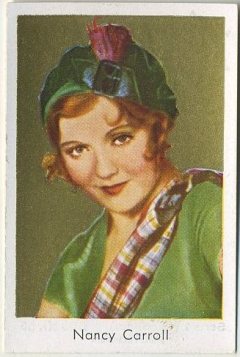 Nancy Carroll has just concluded her period of major stardom by the time of Hot Saturday. She had been not only Paramount’s top star, but just a couple of years earlier she was receiving more fan mail than any other star at any studio. She rose quickly playing showgirls, but also proved herself skilled as a dramatic performer in early talkie melodramas. Hot Saturday is on the lighter end of that, though Carroll gets to showcase her skill at tugging the heartstrings when her character becomes the victim of a small town gossip campaign.
Nancy Carroll has just concluded her period of major stardom by the time of Hot Saturday. She had been not only Paramount’s top star, but just a couple of years earlier she was receiving more fan mail than any other star at any studio. She rose quickly playing showgirls, but also proved herself skilled as a dramatic performer in early talkie melodramas. Hot Saturday is on the lighter end of that, though Carroll gets to showcase her skill at tugging the heartstrings when her character becomes the victim of a small town gossip campaign.
Variety summed up Carroll’s status at that time by grading Hot Saturday as, “a B picture in the big towns and as a first-run choice in smaller spots, among which Nancy Carroll’s following still merits such booking.” Her best days had already slipped past.
Cary Grant’s Romer is the outsider who all of the locals are whispering about. He races around town in his chauffeured car with a woman (Rita La Roy) who lives with him despite their being unmarried. Romer is not a fan of marriage: “Marriage. Ownership. Dreadful thought, isn’t it?” he says to Ruth later, before trying to calm his nerves with a drink. Romer quickly drops the first woman, sending her packing with a check for ten thousand dollars, and ups his pursuit of Carroll’s Ruth Brock.
Ruth is a popular bank clerk who all of the boys want to date. Fellow clerk Conny (Edward Woods) is her choice of the moment. Romer contrives to spend time with Ruth by inviting Conny and all of their friends to his place, promising that the top shelf liquor will freely flow. While the other kids drink and dance, Romer and Ruth take a walk and get to know each other better.
Ruth is very interested in Romer, but his reputation preceeds him. “You’re considered much too dangerous for local consumption,” she told him earlier at the bank. She does her best to be careful around him, but when he catches her lounging in his guest room and asks what she thinks of it, Ruth replies, “I wouldn’t be interested in a short term lease.” She makes a hasty exit to rejoin Conny who is surprised she didn’t keep him waiting longer. “I didn’t dare,” says Ruth, gasping to catch her breath.
Later that night at Willow Springs, the town nightspot, Conny convinces Ruth to take a boat ride with him. He rows out in the distance then off towards shore where he pounces upon her. “Oh, I see,” he says after Ruth pushes him off of her. “You like Romer’s petting better than mine, huh?” She asks him to take her back and Conny refuses. “Make a sap out of me twice in one day?” he asks, referring to her ditching him earlier to spend time with Romer. “I’ve got a little something coming to me.”
Ruth is incensed. “What do you expect from a boat ride? Marlene Dietrich?” she asks, invoking the name of Cary Grant’s co-star in his previous Paramount film, the classic Blonde Venus. Conny gives up, stranding Ruth on the shore as he rows back to Willow Springs.
Luckily Romer’s house is nearby.
An innocent visit is interrupted when Conny, feeling guilty, comes looking for Ruth. She runs away, not wanting to be seen alone with Romer. She has Romer’s chauffeur drive her home, alone, where she is spotted arriving by her rival, Eva Randolph (Lillian Bond), whose own lipstick is smeared all over Archie’s (Grady Sutton) face.
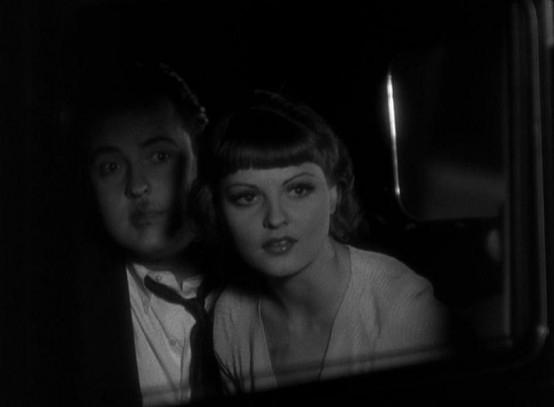
Above: Grady Sutton and Lillian Bond. This scene was ordered cut by the New York Board of Censors, who objected to Bond adjusting her dress and especially the “distinct view of marks on girl’s breast.” You may need to click to enlarge the image to see those marks, but they are there.
The following day Eva passes word to Conny that she saw Ruth come home late in Romer’s car. Conny lies when he tells Eva that Ruth had run off before they could even go on a boat ride together. Eva surmises that Ruth would have then spent at least four hours alone with Romer, an incorrect assumption because of Conny’s fib. But Eva’s aunt latches onto this piece of information and the local switchboard becomes a flurry of activity as word spreads about Ruth Brock and Romer Sheffield.
The rumor ruins Ruth. She is ignored, ostracized and even loses her job at the bank because of her supposed immorality. She explains to her father (William Collier, Sr.), “Well it seems I’m an immoral woman. And immoral women shouldn’t work in banks, you know. They might corrupt the young dollar bills.” Loving father takes pity on her while hot-tempered mother (Jane Darwell) paints her face with a series of weak, but insulting, slaps.
Ruth is in total disgrace.
Childhood sweetheart Bill Fadden (Randolph Scott), who has returned to town after seven years away, offers a way out. Ruth admires Bill, possibly even loves him, but she and her parents do all they can to rush him to the altar.
While it is not a remake, a very similar scenario is repeated a few years later in the unrelated Party Wire (1935) from Columbia. In that movie the town gossips overhear Will Oliver (Charley Grapewin) insist that Roy Daniels (Robert Allen) delay his leaving town to come over and help his daughter, Marge (Jean Arthur), out of the jam he’s gotten her into. While the phone call was over a simple accounting problem, the eavesdroppers think the worst when it comes to Marge’s problem. Marge is also outcast and loses her job at the bank, actually the same type of position Nancy Carroll held in Hot Saturday. Marge’s relationship with Matthew Putnam (Victor Jory), returning hometown boy made good, is threatened by the gossip. Or so she thinks.
 The Jory character in Party Wire actually never wavers, but the same cannot be said of Randolph Scott’s returning geologist in Hot Saturday.
The Jory character in Party Wire actually never wavers, but the same cannot be said of Randolph Scott’s returning geologist in Hot Saturday.
While the two movies are from different studios and come from completely different source material, there are enough similarities, including the basic theme, to group them together. In fact, if you have both on hand I’d recommend them as a double-feature. If you really want a full evening put a cherry on top with These Three (1936).
While we’re on the subject of gossip, it actually reaches beyond the screen in touching two Hot Saturday cast members, Cary Grant and Randolph Scott. Normally I wouldn’t go down this road, but seeing them together is certain to prompt the question while Hot Saturday’s subject matter almost begs the answer.
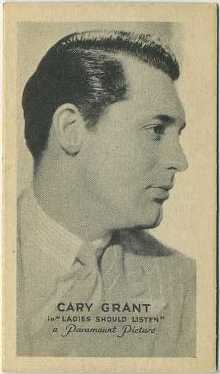 Grant and Scott are the longstanding subjects of one of Hollywood’s loudest whisper campaigns. The two young Paramount contract players met prior to Hot Saturday and rented a house together. Not terribly unusual for two young actors just starting out, but what raised eyebrows was when the living situation continued for years after they became more established and better paid Hollywood stars. Grant departed briefly while he was married to Virginia Cherrill in the mid-30s, but the arrangement did not come to a permanent end until after he married Barbara Hutton in 1942.
Grant and Scott are the longstanding subjects of one of Hollywood’s loudest whisper campaigns. The two young Paramount contract players met prior to Hot Saturday and rented a house together. Not terribly unusual for two young actors just starting out, but what raised eyebrows was when the living situation continued for years after they became more established and better paid Hollywood stars. Grant departed briefly while he was married to Virginia Cherrill in the mid-30s, but the arrangement did not come to a permanent end until after he married Barbara Hutton in 1942.
Biographer Graham McCann mentions that they eventually lived in a large seven-bedroom house which was often filled with house guests. McCann quotes William Randolph Hearst, Jr. as remembering the house as a party atmosphere with “girls running in and out of there like a subway station” (125-126). Thanks to Grant’s distant nature gossip columnists went their own way with their reportage and despite what friends, wives, and ex-wives said throughout the years, the rumors of a sexual relationship between Grant and Scott persists. Beyond the gossip the only evidence was their shared address and studio publicity photos of the men at leisure.

Above: For once an ad actually describes what’s going on in the movie! Found in the Sunday Spartanburg Herald-Journal, December 18, 1932, page 16.
While Hot Saturday received a good deal of ballyhoo on its way from production to theaters, critics of the day didn’t think it met expectations. Another irony, given Hot Saturday’s placement in our modern set of videos intended to collect pre-Code shockers, is that it was regarded as rather tame in 1932. “A little better than average … and you can take the whole family,” said New Movie Magazine while Film Daily informed exhibitors that “There’s nothing of a sensational nature about the goings on.” Fan magazine Modern Screen called it very good but warned, “the kids will be bored.”
It was received as a middling and conventional production with most of the praise reserved for Cary Grant. Returning to New Movie Magazine for a gaze inside their crystal ball: “Cary Grant, who is going to be far better known in the near future, heads the cast.” Good call, and not yet an obvious one.
Randolph Scott, by the way, doesn’t impress very much. He’s handicapped by not making his appearance until over forty minutes into the movie, but once he arrives he provides little more than another pretty face. Actually, better work is turned in by Edward Woods (Cagney’s running mate in The Public Enemy) as Conny and Lillian Bond as Eva, the two most vengeful characters in Hot Saturday.
While Hot Saturday offers a less than conventional solution to the problem at hand—and compare to Party Wire for the more conventional solution—it is, as the period reviewers first reported, pretty much an average movie. It is elevated slightly by its mildly thought provoking resolution and the pure presence of Cary Grant getting comfortable in his Cary Grant skin.
Danny at Pre-Code.com has a great review of Hot Saturday on his site, where he settles his “indifferent” tag upon it. Since that is the middle choice of three options, I probably agree, though I’m leaning more “Like” than “Dislike” as of today.
As mentioned earlier Hot Saturday is part of Universal’s 2009 Pre-Code Hollywood Collection, which also includes The Cheat (1931), Merrily We Go to Hell (1932), Torch Singer (1933), Murder at the Vanities (1934), and Search for Beauty (1934). That’s how they’re listed on the case, with Hot Saturday tucked between Merrily We Go to Hell and Torch Singer, and oddly, that’s how I would rank them in terms of my own order of personal preference.
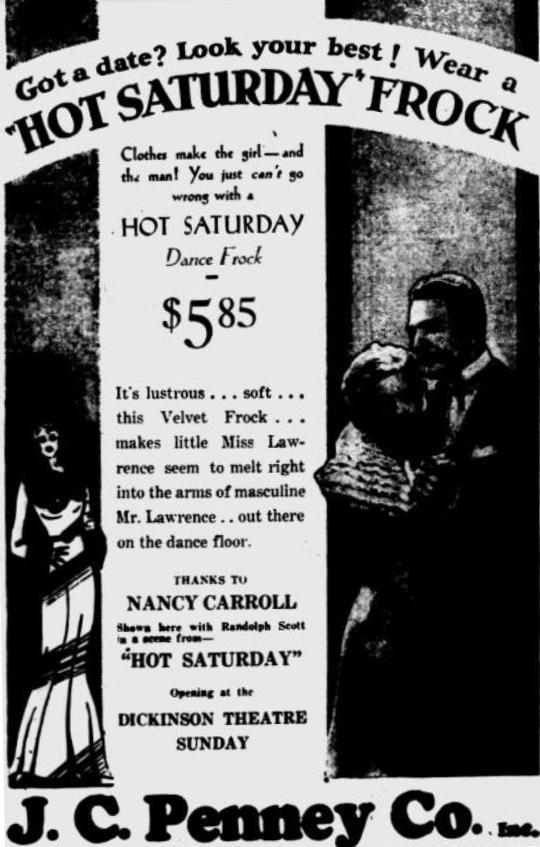
I have a feeling that J.C. Penney may not have received the intended return on this ad campaign. Found in the Lawrence Daily Journal-World, December 15, 1932, page 6.
Cited
In addition to Film Daily and other periodicals discovered through Lantern, key sources included:
- “Film Reviews.” Rev. of Hot Saturday. Variety 8 Nov 1932: 16.
- McCann, Graham. Cary Grant: A Class Apart
New York: Columbia University Press, 1996.
- “New Pictures You Should See and Why.” Rev. of Hot Saturday. New Movie Magazine Dec 1932: 106.
- What Shocked the Censors! New York: The National Council on Freedom from Censorship, 1933: 43.




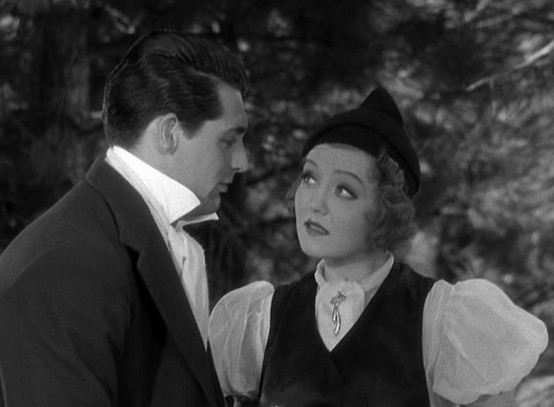





[…] bank scenes but kewpie-doll pretty in the rest and she’s very alive and vivacious throughout. Cliff Aliperti in Immortal Ephemera writes that ‘Nancy Carroll has just concluded her period of major stardom by the time of Hot […]